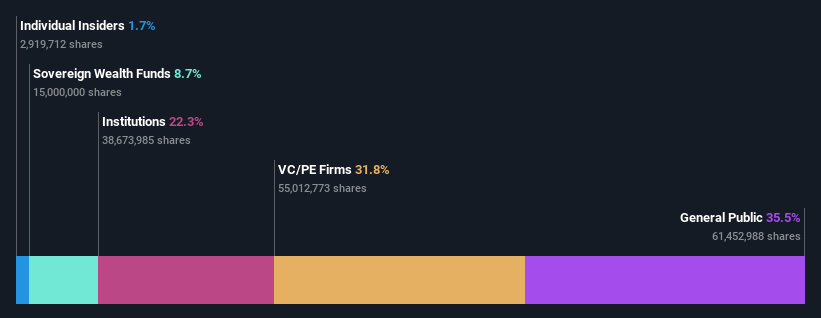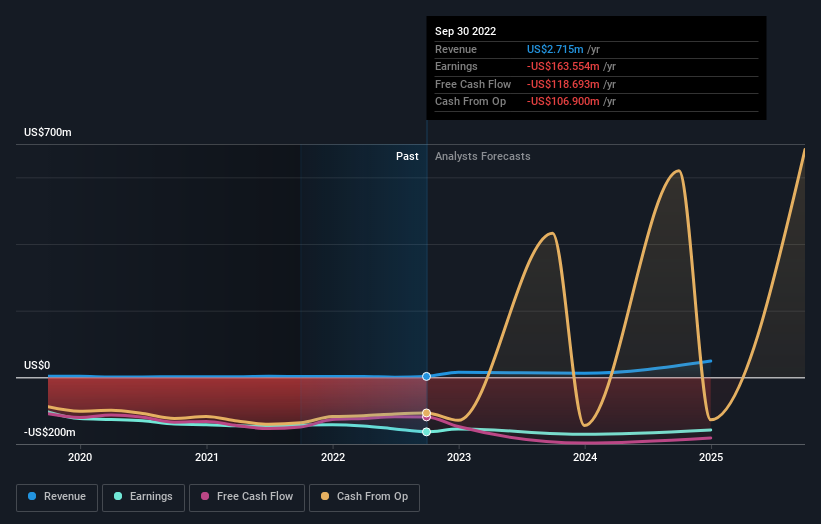Individual investors account for 36% of Autolus Therapeutics plc's (NASDAQ:AUTL) ownership, while private equity firms account for 32%
If you want to know who really controls Autolus Therapeutics plc (NASDAQ:AUTL), then you'll have to look at the makeup of its share registry. We can see that individual investors own the lion's share in the company with 36% ownership. Put another way, the group faces the maximum upside potential (or downside risk).
And private equity firms on the other hand have a 32% ownership in the company.
Let's take a closer look to see what the different types of shareholders can tell us about Autolus Therapeutics.
Check out our latest analysis for Autolus Therapeutics
What Does The Institutional Ownership Tell Us About Autolus Therapeutics?
Many institutions measure their performance against an index that approximates the local market. So they usually pay more attention to companies that are included in major indices.
Autolus Therapeutics already has institutions on the share registry. Indeed, they own a respectable stake in the company. This can indicate that the company has a certain degree of credibility in the investment community. However, it is best to be wary of relying on the supposed validation that comes with institutional investors. They too, get it wrong sometimes. If multiple institutions change their view on a stock at the same time, you could see the share price drop fast. It's therefore worth looking at Autolus Therapeutics' earnings history below. Of course, the future is what really matters.
We note that hedge funds don't have a meaningful investment in Autolus Therapeutics. The company's largest shareholder is Blackstone Life Sciences, with ownership of 12%. For context, the second largest shareholder holds about 11% of the shares outstanding, followed by an ownership of 8.7% by the third-largest shareholder. In addition, we found that Christian Itin, the CEO has 0.6% of the shares allocated to their name.
We did some more digging and found that 6 of the top shareholders account for roughly 52% of the register, implying that along with larger shareholders, there are a few smaller shareholders, thereby balancing out each others interests somewhat.
While studying institutional ownership for a company can add value to your research, it is also a good practice to research analyst recommendations to get a deeper understand of a stock's expected performance. There are a reasonable number of analysts covering the stock, so it might be useful to find out their aggregate view on the future.
Insider Ownership Of Autolus Therapeutics
The definition of company insiders can be subjective and does vary between jurisdictions. Our data reflects individual insiders, capturing board members at the very least. Company management run the business, but the CEO will answer to the board, even if he or she is a member of it.
I generally consider insider ownership to be a good thing. However, on some occasions it makes it more difficult for other shareholders to hold the board accountable for decisions.
Our most recent data indicates that insiders own some shares in Autolus Therapeutics plc. As individuals, the insiders collectively own US$5.4m worth of the US$323m company. It is good to see some investment by insiders, but it might be worth checking if those insiders have been buying.
General Public Ownership
The general public-- including retail investors -- own 36% stake in the company, and hence can't easily be ignored. While this size of ownership may not be enough to sway a policy decision in their favour, they can still make a collective impact on company policies.
Private Equity Ownership
With a stake of 32%, private equity firms could influence the Autolus Therapeutics board. Sometimes we see private equity stick around for the long term, but generally speaking they have a shorter investment horizon and -- as the name suggests -- don't invest in public companies much. After some time they may look to sell and redeploy capital elsewhere.
Next Steps:
It's always worth thinking about the different groups who own shares in a company. But to understand Autolus Therapeutics better, we need to consider many other factors. To that end, you should learn about the 5 warning signs we've spotted with Autolus Therapeutics (including 3 which are concerning) .
But ultimately it is the future, not the past, that will determine how well the owners of this business will do. Therefore we think it advisable to take a look at this free report showing whether analysts are predicting a brighter future.
NB: Figures in this article are calculated using data from the last twelve months, which refer to the 12-month period ending on the last date of the month the financial statement is dated. This may not be consistent with full year annual report figures.
Have feedback on this article? Concerned about the content? Get in touch with us directly. Alternatively, email editorial-team (at) simplywallst.com.
This article by Simply Wall St is general in nature. We provide commentary based on historical data and analyst forecasts only using an unbiased methodology and our articles are not intended to be financial advice. It does not constitute a recommendation to buy or sell any stock, and does not take account of your objectives, or your financial situation. We aim to bring you long-term focused analysis driven by fundamental data. Note that our analysis may not factor in the latest price-sensitive company announcements or qualitative material. Simply Wall St has no position in any stocks mentioned.
Join A Paid User Research Session
You’ll receive a US$30 Amazon Gift card for 1 hour of your time while helping us build better investing tools for the individual investors like yourself. Sign up here


